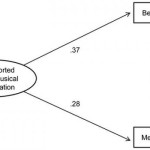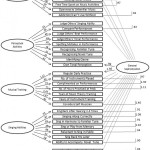
As with most art, musical ability and talent is difficult to measure.
However, Dr. Daniel Müllensiefen, Senior Lecturer in Psychology and co-director of the MSc in Music, Mind and Brain at Goldsmiths, University of London, is using some interesting metrics to quantify an individual’s musicality.
Dr. Daniel Müllensiefen obtained his PhD in Systematic Musicology from the University of Hamburg, Germany, and subsequently worked as a Research Fellow in the computing department at Goldsmiths, University of London. Since 2009 he has been working in the psychology department at Goldsmiths as a lecturer and co-director of the Master’s programme in Music, Mind and Brain. His main research areas include computational models of music perception and cognition and individual differences in musical expertise.
Dr. Daniel Müllensiefen – Measuring Musicality
Lenny Bernstein had it. Goldie has it. Nigel Kennedy has it as well, not to forget others such as Beatles-producer George Martin and radio DJ John Peel.
But what is it? All of those people can be described as musical, each in their own individual way. Everyone would agree with that.
But, surprisingly or maybe not, it is far more difficult to find consensus on what it actually means to be musical and, even more difficult, how to measure it.
To get a handle on this question, we recently developed the Goldsmiths Musical Sophistication Index (or Gold-MSI) – a new self-report questionnaire that comes together with a battery of objective listening tests.
The Gold-MSI assesses all aspects of how people can actively engage with music in a skilled way regardless of musical style. The Gold-MSI was rolled out to a large audience in 2011 together with the BBC, with more than 146,000 people taking the test, including more than 90,000 participants from Britain.
This allows us for the first time to investigate the musical profile of an entire nation and the comparison with other population statistics, such as the wealth of the local area that participants lived in.
The results have now been published and one main finding shows how wealth is significantly correlated with the amount of musical training that people have received in their lives but also with their performance on the objective listening tests.
For every point scored on the ‘beat perception test’ the average weekly income of the community living at the participants’ postcode was £99 higher and for every point on ‘melody memory’ the average increase was £111.
So far these are just correlations, but the next step is to look into causal mechanisms: Can people from a wealthier background simply afford more music lessons? Or does music make you smarter and ultimately richer? Or is there a common third factor such as intelligence or personal ambition that affects where you live and how good you are with music?




Comments
One response to “Daniel Müllensiefen, Goldsmiths, University of London – Measuring Musicality”